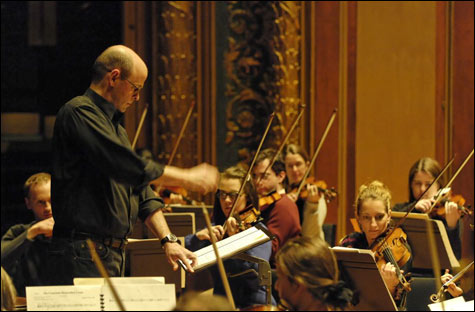
GIL ROSE AND BMOP: Their concluding concert attracted the festival’s largest audience. |
It’s been 17 years since Boston’s last local festival of contemporary music, the New Music Harvest organized by composer Charles Fussell: 19 programs (several free), a celebration of composer Ned Rorem, an opera production performed by BU students, and the participation of the Boston Symphony Orchestra. It was to be a biennial event, but the funding never materialized. This year, Gil Rose, director of Boston Modern Orchestra Project and Opera Boston, supported by the Alice M. Ditson Fund (encouraging music by emerging American composers) and the Boston Musicians’ Association, organized a four-day weekend of eight concerts at the Institute of Contemporary Art’s elegant 325-seat Barbara Lee Family Foundation Theater, with its magical views of Boston Harbor.
Eight groups participated (Collage New Music and the Cantata Singers, both directed by David Hoose, in the same concert), with a celebrity concert by cellist Matt Haimovitz. Only one concert came close to selling out (BMOP), and there was a big problem with time management. Most of the evening programs ran over their allotments. (Was no one counting the endless stage reconfigurations for each new piece?) Try getting anything to eat or drink between the end of the 6:30 pm concert and the beginning of the 8 pm event with the planned 45-minute break cut drastically short. (People started bringing their own dinners.) Those attending both concerts on a single day had to sit through some four hours of new music. My own attention span came close to the breaking point.

Yet every concert included something memorable. We got seven world premieres and two local premieres. (A third was scratched because the cellist was attending the birth of his first child.) And the playing was phenomenal. The Barbara Lee Theater acoustics are exceptionally bright and clear, dry without being harsh, though individual voices fared less well than instruments or choruses, and the theater isn’t fully insulated from hallway noise.
Each group established its own personality and tone. The Firebird Ensemble emphasized energy and youth, so even the 3-D soundscape of elder statesman Mario Davidovsky’s Flashbacks (1995) sounded fresh-minted in its moody but titillating unpredictability. Thirty-four-year-old Curtis Hughes’s 2005-’06 danger garden was an engagingly lively trigger for the entire festival. Replacing the late Donald Martino’s Rhapsody (the piece with the father-to-be), clarinettist Rane Moore gave a gripping reading of Elliott Carter’s witty four-minute internal dialogue, Gra, which was composed for Polish composer Witold Lutoslawski’s 80th birthday — a perfect set-up for Lee Hyla’s Polish Folk Songs (2007), a brash “collision” of authentically raw folk material that included a bagpipe-like melodica.
Our senior new-music ensemble, Richard Pittman’s Boston Musica Viva, celebrated its 40th anniversary with a rather disconnected program consisting of pieces BVM had commissioned and/or premiered. The concert started and ended with two recent nature pieces: New Mexico native Julie Rohwein’s brand new and, to me, both obvious and disjointed Borne on the Wind and Chou Wen-Chung’s languid and monochromatic Twilight Colors (2007). Chou’s image of a “changing sky over the Hudson River Valley” doesn’t seem to change very much in four movements. Perhaps these pieces were not in the right place. Gunther Schuller’s brilliant and pithy Four Vignettes (2007), which begins with a truly atmospheric and varied movement called “Atmospherics,” might have made a more effective curtain raiser or closing number. Mezzo-soprano Pamela Dellal provided powerful characterizations in Ronald Perrera’s Cold War chamber piece with tape, Three Poems of Günter Grass (1974 — 32 years before Grass’s startling confession that he’d been drafted into the Waffen SS). But Deborah Cornell’s abstract computer graphics, in Tracer (2003), distracted me from her husband Richard Cornell’s music.
Scott Wheeler’s Dinosaur Annex provided the festival’s most amusing concert, beginning with the Boston premiere of Wheeler’s The Gold Standard, a setting of the late Kenneth Koch’s timely satirical poem about two Chinese monks (tenor Frank Kelley and baritone David Kravitz) bewildered by the nature of American currency. Richard Beaudoin had to wait four years for the premiere of his Eunoia Songs (“eunoia” — “beautiful thinking” — is the shortest English word to contain all five vowels, which are also present in the name Beaudoin). Maybe his settings of five hilarious sonnets by Canadian poet Christian Bök (each one restricted to a single vowel) were deemed unfit for polite company (as in “a prurient debauch,” the “o” poem, in which “Johns who don condoms for blowjobs go/downtown to Soho to look for pornshops known/to stock lots of lowbrow schlock”). The concert ran twice as long as it should have, but how could you cut Brian Robison’s new Dança da Tranquilidade, for marimba, clarinet, cello, and theremin (played by the composer), the Barbara White premiere, or Ezra Sims’s delicious 1967 setting of Edward Gorey, Alice Hawthorne in memoriam?